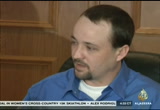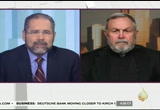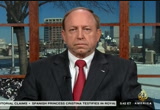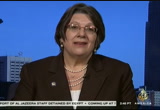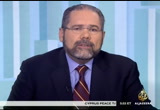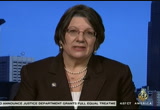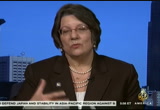tv Inside Story Al Jazeera February 8, 2014 5:30pm-6:01pm EST
5:30 pm
5:31 pm
terrible he or she could be killed for it, carrying out the death sentence is complicated. the u.s. has largely moved away from gas chambers, shootings, and electric cushion to kill the convict. the 8th amendment to the u.s. constitution states simply, excessive bail should not be required, nor cruel and unusual punishments inflicted. though the intention is to end up with a dead pilsner, how do we police the fine line between an allowable death and a death looking something closer to torture. the state of texas executed suzanne wednesday.
5:32 pm
she was only the 14th woman to be executed in the united states since the death penalty was reinstated. she made no final statement, but smiled at two friends, mouthed a brief word, then nodded. texas used a relatively new protocol involving a single drug. after the drug was administered, she began to snore. reports say it look 11 minutes to die. despite the apparently quiet death, there is a growing concern amock opponents of the death penalty, that states are increasingly turning to questionable methods. a drug protocol that some see as cruel and unusual. mcguire was sentenced for the 1989 rape and killing of a pregnant woman. for the first time anywhere in
5:33 pm
the united states, and two-drug protocol was used. after the drugs were injected mcguire, according to witnesses, wheezed, coughed, and strained against the restraints holding him to the table. he clenched his fists and appeared to be sucking for air. it took more than 20 minutes for him to die. the day after the excuse the mcguire family announced a lawsuit >> i don't feel like any family should deal with what we dealt with over the past couple of days let alone yesterday. i don't feel like anywhere deserves that, families or my dad. anybody on death row. nobody deserves to go through that. "america tonight." >> i believe that my dad shouldn't have been an experiment. they shouldn't expeer meant with
5:34 pm
anybody, let alone my father. >> capitol punish is legal in 32 states in the us. in the latest gallup poll, 60% of americans still support the death penalty, a 40-year low with support declining from the heights of 1994. louisiana stayed the execution of christopher while it can review the drug protocol. the death penalty is now on hold in a number of execution states. some delays are the result of controversies and legal disputes over the shortage of lethal injection drugs. they stopped shipping sedatives to american prisons because of their intended uses. the states have had to reform late their lethal drug recipes. new and untested combinations of drugs have raised questions
5:35 pm
about inmate's right to be spare cruel and unusual punishment. now some states are reconsidering the turn to olde methods. joining us now from columbus, ohio is father lawrence hummer, he's a catholic paster from ohio who also does prison ministry. father hummer watched the excuse of dennis mcguire. thanks for being us on "inside story" today. how did you come to be at the execution? and was it the first time? >> the first time i witnessed an execution, yes. this is the second prisoner i have been with who was executed in the death house at lucasville, ohio. >> and could you tell us what began. >> the procedure began at 10:27
5:36 pm
with the prisoner lying in a position on a gurney. after struggling to get a needle into his arm -- his right arm -- they left to his left arm. at 10:27, according to a -- signal that is given by the warden, the drugs they administer began to enter his arm. he rose up briefly to say good-bye to his children and say he loved them, and then he lay back down quietly. his stomach cavity began to fill up at 10:31, and from 10:33 until 10:47 -- until 10:44 he began to audibly gasp for air we could hear through the window, a kind of choking sound that went on until 10:44, and at that
5:37 pm
point, there was no more audible sound. a technician came in to try to take his -- presumably to find his life signs or vital signs. that lasted until finally he was declared dead at 10:53. >> if the intention is to take away a man's life. how should it be done differently. what was wrong with the day way dennis left this world. >> i was given to believe that it took a five-minute procedure. this one lasting 27 -- 26 minutes with audible gasping, i compared to putting a pillowcase over his head and choking him to death. my argument is with the whole death penalty, not just this individual execution. >> but for -- for now, it's
5:38 pm
approved by the supreme court, and like voters across the united states, the people of the state of ohio approve of the ultimate sanction. . in what way could it change in >> it would change in judges, legislators have or governors of state were required to be there or required to start the procedure by hitting a button that sent these chemicals into these people they kill. >> so you maintain if people had to face the consequences of the judgments they make personally, they might not be so quick to make those judgments? >> i do make that argument, yes. >> and what -- would you want people to know about what you saw that day? maybe someone who is watching this program who considers themselves a strong supporter of the death penalty? >> the natural human inclination
5:39 pm
is to preserve life. in that room, i felt trapped. a fellow human being was dying. no matter what he had done himself, the natural inclination is to try to help him, and i was unable to. gathered with a room full of people watching this whole horrible saga unfold, and the agony with which one is forced to witness it, including his own children, and these survivors -- or the -- the victim's witnesses themselves makes won wonder is that not themselves. >> so you are suggesting that there is a sort of out of sight, out of mind aspect to this -- >> certainly -- >> that society is at peace with the death penalty, because they out. >> it certainly seems that way
5:40 pm
5:41 pm
5:42 pm
could drive up your health care premium. i'll make the connections from the news to your money real. welcome back to "inside story." i'm ray suarez. the federal government, the united states military, and 32 states in the country allow the death penalty. seven people have been executed this year. on this edition of our program, we're talking about the growing concern over the use lethal injections. there is a shortage of the drugs used, using new and untested combinations. joining us is the attorney general of colorado. here in studio, executive director of the death penalty information center. and from cleveland, an ohio
5:43 pm
state representative who is pushing forward legislation that would abolish the death penalty in her state. attorney general let me start with you. are there many people on colorado's death row? >> there is very few -- i think three or four on death row, it hasn't been carried out in i think like 16 years, something along those lines, but i have been an advocate, advocate, we should not abolish the death penalty. i do not advocate wide-spread use of the death penalty, but i maintain there are certain few crimes for which the vast majority of americans and coloradoans would conclude that life in prison is not an adequate societal response. let me give you a couple of examples. we have a guy facing first
5:44 pm
degree murder charges. he orchestrated the murder of witnesses against him. if you don't have a death penalty, gets no greater consequence for murdering the witnesses in the case against him than had he not done so. you have a scenario where an immate premeditatedly kills on prison officer. i think the vast majority of people would say taking away tv privileges is enough. i think we have to keep it on the books, and i have certainly advocated this in colorado for those types of scenarios, for the timothy mcveigh, oklahoma citiment bombing scenarios, where most people would agree putting him in prison for life is not an adequate response.
5:45 pm
>> as it been made complicated when you have supreme court emergency hearings, stays, moratoriums, as states try to figure out how to execute patients -- inmates, when they can't get the right drugs or have unproven protocols, has it made it more of a challenge? >> sure it's a challenge. this should not be something that is done lightly or easily. i don'ting mind the tremendous anti-death penalty efforts that are made by lawyers. i mean that's all part of the system. i will tell you that a lot of what is going on with the -- the drug protocols right now has to do with the effectiveness that the anti-death penalty forces have had in reducing the supply, helping to reduce the supply of certain types of drugs. that's what is going on with experimentation of other drugs.
5:46 pm
but that needs to be straightened out. there are all kinds of protocols we could use. i think some states still retain hanging -- i think utah does. we could have firing squads. whatever. i think it's appropriate to try to find a type of execution protocol that the public is most co comfortable with. but these are decisions that need to be made by the people. we had legislative efforts in colorado to abolish the death penalty the past couple of years, despite the fact -- like in a poll that came out yesterday, 66% of coloradoan favor retaining a death penalty on the books. >> let's turn to ohio, where we heard about the execution of dennis mcguire. representative, i'm guessing if we took a poll of ohioans, we
5:47 pm
would still find a majority that would approve of the death penalty. why are you trying to abolish it in your state? in >> i think as we have seen in this most recent case, and what our whole population was exposed to, and then afterwards, yes, you can find people on both sides of the issue, but i don't think that's the point. i think the point is that as a society we should be evolving, and to me part of our evolution towards a more just society includes eliminating the death -- the use of the death penalty. and i think the mcguire case pointed out how futal in 2014 how difficult it is to execute someone in a
5:48 pm
constitutional way. a poll -- national poll about two years ago showed that 61% of voting americans favor some other alternative to the death penalty in murder cases. so clearly there's a lot of discussion that needs to be had in our state but in the country as well. >> do you believe the execution of dennis mcguire crossed the punishment? >> i do, and i say that knowing that there are people, certainly who would point out then that his crime was also cruel and unusual punishment to his victim, and i also acknowledge that, but executing dennis mcguire does not bring back his victim, does not -- will never change the lives of his victim's families in terms of they still
5:49 pm
will continue to be without her. at the same time, we've -- we've had the state sanction and taxpayer dollars go towards ending the life of a human being, and i think that is not something that we should be doing in this state. >> richard, even though many states maintain the death penalty on the books, haven't american jurisdictions been backing away there it? >> yes, there has been a dramatic decline in the use of the death penalty since about the 1990s. death sentences have dropped 75%. there were 80 last year, 319 in the mid-1990s. so this is a dwindling kind of punishment. it's not really part of the criminal justice system. it really doesn't respond to, say, murders in our country,
5:50 pm
it's more of a symbolic thing, and that's a question, why do something that has just mostly symbolic value. >> if it's -- its use is largely confined to one region of the country, why not just let time take care of it. >> well it is still sort of anomaly. you see people on death row who are mentally ill, people who didn't have good representation. and of course human lives are at steak. and although i said the death penalty is decreasing, still 3,100 people on death row, and 32 states have it. so i think we're at a cross roads. we're at a decision-making, something that we used in the
5:51 pm
century? >> and that's where we'll continue when we come back after a short break, talking about what happens to the death penalty now, and whether there is an inherent conflict between trying to end a life, and end it humanely as a punishment? this is "inside story." ♪ the stream is uniquely interactive television. in fact, we depend on you, your ideas, your concerns. >> all these folks are making a whole lot of money. >> you are one of the voices of this show. >> i think you've offended everyone with that kathy. >> hold on, there's some room to offend people, i'm here. >> we have a right to know what's in our food and monsanto do not have the right to hide it from us. >> so join the conversation and make it your own. >> watch the stream. >> and join the conversation online @ajamstream.
5:53 pm
5:54 pm
since the death penalty was reinstated. attorney general southers, do our legal definitions change overtime? that phrase cruel and unusual punishment reaches out to grab us from 1789, and i'm wondering if the men that wrote and ratified the constitution would have wrote cruel to come of the things we do today? >> i suspect they would not have. when they were talking about that, they weren't talking about the death penalty as cruel and unusual. it indicates they were looking at dismemberment for property crimes and things like that as crucialal unusual. and while i appreciate supreme court justices coming to the conclusion that society has evolved in such a way that the death penalty is now cruel and unusual.
5:55 pm
i think that's a little bit of the legal intelligencea imposing their own viewpoints. let's let the society, the people decide whether or not we have evolved to the point where the death penalty is cruel and unusual. and if the people in a particular state want to come to that conclusion, that's fine. i'm just arguing in the context of the modern society and the types of crimes we see. mass terrorist killings, the killing of witnesses, there's a societal self-defense element that still exists, and i would be very reluctant to take the death penalty off of the books in colorado because of these limited types of crimes for which just simply saying we're going to look this guy up for life doesn't appear to be
5:56 pm
appropriate. >> what about that? the framers were horrified by the prospect of disproportionment punishment. >> if we want to go back to the founders we would found a group of people who were very suspicious of too much governmental power, and believed in in a system that would grow and change. and there was room for that. and i think, you know, punishments that were acceptable and maybe even thought necessary, because how else do you deal with repeat offenders, but now we have life in in prison without parole. some of the worst offenders didn't get the death penalty. the unibomber, so many people don't get the death penalty. if it was really necessary as the attorney general talked about, we would have thousands of executions, but we don't use it that way.
5:57 pm
we use it in this sort random, the government says you but not you, that's the kind of power i think our founders would have been suspicious of that. >> representtive what go you think about that. having a death penalty that is targeted only to the most heinous of crimes, and an advocate saying we don't really apply it that way. what is going on in ohio? and are the people of your state proposal. >> well, what is going in my state and my country, which is one of the top five counties to have people on death row and use it disproportionately. often it is a way to get plea bargains out of it. but the death penalty is where it starts instead of where it
5:58 pm
finishes. it has been seen and shown to be used across racial lines as well, and also with the count of one's economic background, so we have lower income people as mr. dieters pointed out, in terms of that disproportion at it use of the death penalty. i believe we are ready for this discussion and part of it is to educate the general public that there is more to it. i think -- you know, father hummer talked about the fact that once the death penalty is applied, it happens in a very, very small place. and the rest of the population gets to back away from it. we hear about an extraordinary story, but day-to-day we have no concept of what is going on. so these discussions are very important. it is expense if.
5:59 pm
it is cruel on the part of the victim's families, because every appeal they have to relive the crime all over again. and i have heard from victim's families who have told me that. >> rep senttive, we're just about at the end of our time, let me jump in. >> sure. >> are you ready to look at this, if there are problems with the drugs, appeals, stays from the supreme court, whatever, if it results in fewer executions you are okay with it? >> no. i -- i really believe that there is no humane constitutional way to use execution. i am for the abolishment of the ohio. >> thank you very much for joining us all of you. that brings us to the ed of this edition of "inside story." thanks for being with us. in washington, i'm ray suarez. ♪
6:00 pm
♪ >> this is al jazeera america live in new york. i'm jonathan betz. another victory for same-sex marriage. the justice department extends more rights to gay couples. aid teams attacked in syria. they are now trying to help civilians as they come under fire. violent protests in turkey over an a new internet law that would let the government block websites and track users. and firefighters battling
88 Views
Uploaded by TV Archive on

 Live Music Archive
Live Music Archive Librivox Free Audio
Librivox Free Audio Metropolitan Museum
Metropolitan Museum Cleveland Museum of Art
Cleveland Museum of Art Internet Arcade
Internet Arcade Console Living Room
Console Living Room Books to Borrow
Books to Borrow Open Library
Open Library TV News
TV News Understanding 9/11
Understanding 9/11



